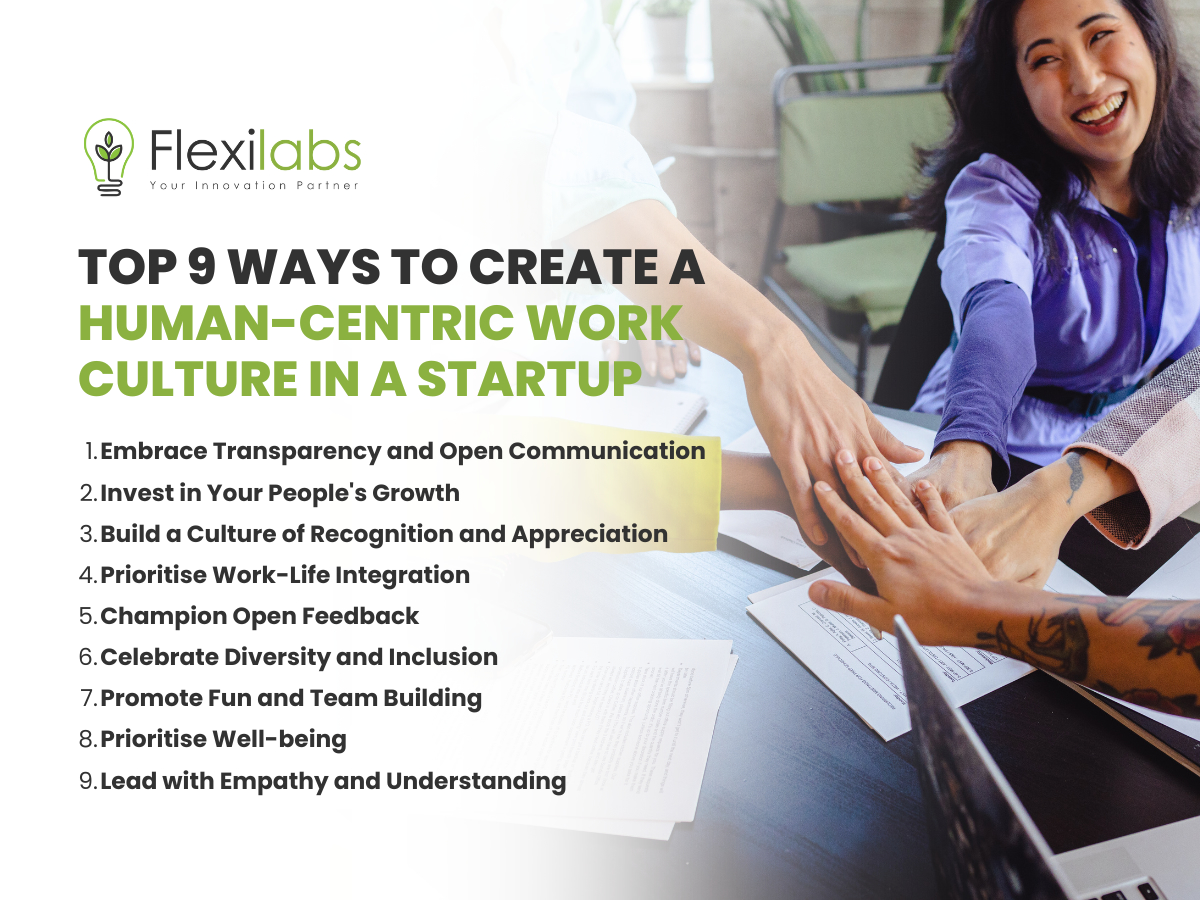Startup succeeds in innovation and ambition. But at the heart of every successful startup is a strong team. These are the individuals who translate vision into reality, who overcome hurdles with ingenuity, and who collectively propel the startup forward. With that said, fostering a human-centric work culture is a must.
However, creating a human-centric work culture isn’t a one-size-fits-all endeavour. It requires a multifaceted approach tailored to each startup’s unique dynamics and challenges. In this article, we’ll delve into the top nine ways startups can cultivate a workplace environment that not only fuels innovation and growth but also fosters a sense of belonging and fulfillment among its employees.
Why is a human-centric work culture essential in a startup?
Startups thrive on creativity, agility, and a relentless pursuit of success. But these qualities can only flourish when your team feels valued, supported, and empowered. A human-centric work culture prioritises the well-being and growth of your employees. This can lead to various benefits, such as:
- Increased Employee Engagement. People who feel appreciated and heard are more invested in their work, leading to higher productivity and innovation.
- Reduced Turnover. Happy employees are likelier to stick around, saving you the time and cost of constant recruitment.
- Enhanced Talent Acquisition. A positive work culture attracts top talent seeking a fulfilling and supportive work environment.
- Stronger Employer Branding. Building a reputation for being a great workplace strengthens your brand and attracts high-caliber candidates.
The 9 Ways to Create a Human-Centric Work Culture in a Startup
Now, let’s dive into ways Flexilabs cultivates a human-centric work environment. Building a human-centric work culture requires ongoing effort and commitment. So, to help you with that, here are nine key strategies to get you started:

Embrace Transparency and Open Communication
Any company thrives with clear and honest communication from leadership down. Startups, by their very nature, navigate uncertainty. They test ideas, iterate on products, and constantly adapt to a changing market. Transparency and open communication are crucial for a startup’s success in this environment.
With that said, startup companies must conduct regular town halls, open-door policies, and accessible leadership teams to ensure everyone is informed, engaged, and feels comfortable voicing their opinions.
Invest in Your People’s Growth
Startups typically have limited resources and rely heavily on their team’s skills and abilities. That said, investing in training and development is essential in building a human-centric work culture. It not only equips your employees with the knowledge they need in their roles but can also lead to increased productivity and efficiency.
Likewise, startups must empower their team with the tools and resources they need to thrive. This includes comprehensive training programs tailored to individual needs and career goals. They should also foster connections between experienced team members and rising stars to share knowledge and provide guidance.
Build a Culture of Recognition and Appreciation
In a fast-paced environment like startups, building a culture of recognition and appreciation for your employees is surprisingly powerful. When employees feel their hard work and achievements are acknowledged, it boosts morale. Recognition shows them their contributions are valued, leading to increased motivation and a desire to go the extra mile. This translates to a more positive and productive work environment.
As such, to build a human-centric work culture, startups must celebrate individual and team achievements, both big and small. They should create opportunities for public recognition through company-wide announcements or internal newsletters.
Prioritise Work-Life Integration
In the startup world, where passion and dedication are often romanticised, prioritising work-life integration might seem counterintuitive. But here’s the thing: burnout is a real threat, and a burnt-out team is unlikely to propel your startup to success
That said, startups must integrate work-life programs such as remote work options, compressed workweeks, or flexible start and end times. They should also provide generous time-off policies that empower their employees to manage their personal and professional commitments effectively. This will encourage them to recharge and return feeling refreshed and ready to contribute.
Champion Open Feedback
Startups require constant improvement and change, which is why feedback is essential. Open feedback from internal teams and external users provides invaluable insights into your product or service’s strengths and weaknesses. This allows you to identify areas for improvement, fix bugs, and tailor your offerings to meet user needs better.
Likewise, startup founders must actively seek constructive feedback through multiple channels. They should conduct regular surveys to gauge employee sentiment, hold one-on-one meetings to discuss career development and goals, and have anonymous suggestion boxes scattered throughout the office. This will allow them to continuously improve and create a workplace that truly meets the needs of our team.
Celebrate Diversity and Inclusion
Diverse teams bring a wider range of perspectives, experiences, and knowledge. This fosters a more creative and innovative environment, leading to better problem-solving and developing solutions that resonate with a broader audience.
That said, startups can embrace diversity by creating a culture that values and respects differences. This includes unconscious bias training, clear anti-discrimination policies, and promoting open communication and collaboration.
Promote Fun and Team Building
Startups thrive in a fast-paced environment fueled by innovation and collaboration. But all work and no play can burn out even the most dedicated team. That’s where promoting fun and team-building activities comes in.
Team building activities create shared experiences and help team members connect personally. This translates to a more engaged workforce, where employees feel valued and enjoy coming to work.
Prioritise Well-being
Startups thrive in a fast-paced environment, demanding long hours and unwavering dedication from their teams. While this drive is essential, prioritising well-being isn’t just about being nice to employees—it’s a strategic investment in your startup’s success. Why? First, burned-out employees are less productive. Second, exhausted employees are more likely to leave. Most of all, chronic stress clouds judgment.
With that said, startups can ensure well-being by offering flexible work arrangements, encouraging breaks, and respecting off-work hours. This allows employees to manage their personal lives and return to work feeling refreshed and energised.
Moreover, they can also offer access to wellness programs or resources that promote healthy eating, exercise, and stress management techniques.
Lead with Empathy and Understanding
Startups rely heavily on their teams. When leaders demonstrate empathy and understanding, employees feel valued, respected, and heard. This fosters a sense of belonging and purpose, leading to higher engagement and reduced turnover. Engaged employees are more motivated, productive, and invested in the company’s success.
That said, startup leaders should prioritise actively listening to their team members, not just hearing them. This involves paying attention to verbal and nonverbal cues and demonstrating genuine interest in their concerns and ideas.
Conclusion
In conclusion, building a human-centric work culture is not just a perk. It is a necessity that cultivates a thriving work environment, increases productivity, and propels your startups toward long-term success. To start on this transformative journey, contact Flexilabs today!









